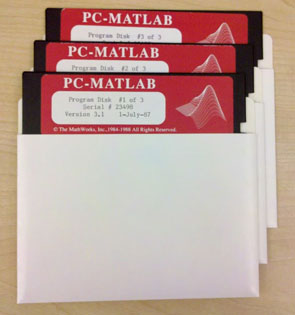Navigating the depth: Advocating for better Engineering Education with MATLAB on YouTube
Today, we are talking to Phil Parisi, who recently graduated from the University of Rhode Island and now works as a robotics researcher at a coastal research laboratory. He also runs a popular YouTube channel where he often discusses MATLAB coding.
When did you first get exposed to MATLAB and Simulink?
I first learned MATLAB during the second semester of my freshman year of college in a general engineering course. This came right after learning 3D CAD modeling and, admittedly, it was a jarring switch. MATLAB was introduced as ‘something we needed to know.’ However, my engineering colleagues and I were focused on design and manufacturing and were confused as to why we needed to start programming. We used the language for the semester and then didn’t touch MATLAB again in our engineering curriculum until our junior year in Numerical Methods.

Hans Scharler and Toshi Takeuchi welcome Phil Parisi for a visit at the MathWorks Campus in Natick, MA.
So, you were not hooked right away?
No. I was not a fan of MATLAB to start. I had no motivation because I didn’t understand why I needed to learn MATLAB in my freshman year.
What changed your mind?
The first time I viewed MATLAB as something that could help me with coursework was in my Linear Algebra class. We were solving matrix functions (e.g. multiplication, determinants, Gaussian elimination) by hand and I began using MATLAB to check my answers. It certainly helped me earn my ‘A’ in that class!
I appreciated the language only after realizing the benefits. In Numerical Methods, we began working with problems that were no longer possible to solve analytically. Seeing how MATLAB could provide approximate, numerical solutions to complex problems was empowering and exciting. It was then that I actually learned MATLAB and actively sought to improve my coding skills.
What else did you use MATLAB for in school?
My MATLAB usage grew exponentially in ocean engineering graduate school. Classes such as Acoustics, Oceanographic Data Analysis, Random Processes, and Probabilistic Robotics all depended on MATLAB to churn through data and generate outputs. Additionally, I used MATLAB for my Masters Thesis research project, seafloor mapping with machine learning, to test out code concepts before writing compilable C++ programs.
MATLAB’s competitive advantage over other languages became clear when my friend and I had to develop a robotic particle filter algorithm to track a free-falling ocean vehicle as it drifted 8,000m to the seafloor. We ran a for loop in MATLAB to continually update the state estimate of the vehicle, and ChatGPT offered ways to speed up the algorithm (parfor loops, reducing data transfer between functions, and pre-allocating space for large matrices). Because of MATLAB’s ease of use, we completed this project in four weeks, wrote a paper, and presented our work at a conference a few months later!

Algorithmically tracking the Deep Autonomous Profiler as it falls 8,000m to the seafloor. A measurement update (gray hemisphere) culls 100,000 particles’ initial positions (red) to more confident estimates (black) using MATLAB.
You started a YouTube channel. Why did you decide to do so?
I wanted to offer students and young professionals an opportunity to learn the MATLAB language through a better lens than when I learned it. I believe engineering brains are wired differently than computer scientists’ brains, and thus the educational approaches to teach engineers how to code must be adjusted. As engineers, we need practical examples of how MATLAB can be used to fit a curve to data, perform numerical integration, or calculate a gradient, while also understanding foundational concepts like data types and data structures. I continually try to coalesce these concepts together into my YouTube videos and wish to provide a comfortable platform for new learners.
You have strong opinions about how MATLAB is taught in engineering schools.
I think there needs to be structural changes in the way universities embrace programming throughout the curriculum. We need to see consistent usage across courses, during every academic semester. In Material Selection, for example, homework problems should ask for the stress seen for each common material at a variety of thicknesses (rather than stress experienced by a 48” cantilever beam made of steel). We can move from a single computation done by hand (the ladder) to using a few matrix calculations that help us understand material behaviors broadly (the former). If this approach can be taken for each class, then engineers will be equipped with a mindset that inherently incorporates programming, rather than using MATLAB purely as an afterthought.
What do you do for work now? Were MATLAB skills useful to get to the position you now have?
Currently, I work as a robotics researcher at a coastal research laboratory. MATLAB was certainly a requirement, in addition to Python, as they are ‘common languages’ spoken across researchers from different fields. However, more important than knowing the language itself was demonstrating my ability to apply a programming language to solve a complex problem. That’s what it really means to ‘know a language’ and that’s what employers want to see.
Do you use MATLAB at your job? If so, can you share something interesting about your use of MATLAB at your job?
Yes, I use MATLAB amidst a variety of programming languages. Daily, I have to ask myself what tool to use to solve a given task. Some days are spent in Python running scripts on a RaspberryPi, others are spent looking at sensor data .mat files in MATLAB, and others are spent learning new frameworks like Docker to spin up Linux environments so projects can run smoothly. I’ve started seeing the macro-perspective of embracing each language for what it’s best at. And when it comes to getting a concept working, quick n’ dirty, I always turn to MATLAB first!









Comments
To leave a comment, please click here to sign in to your MathWorks Account or create a new one.